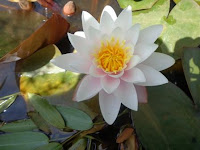'To see far, first see near.’ That
is the sound advice of the American spiritual teacher and author Vernon Howard [pictured
left], whose books, lectures and talks have helped me greatly along life’s way.
Self-change begins with
self-observation. Unless we have insight into our thoughts, feelings, moods and
sensations we will stay the same. We may even regress.
Self-observation comes from a
mindful attention to, and choiceless awareness of, the content of the present moment, from one such moment to the next.
The word ‘content’ refers to both psychological and physical (including
bio-physical) content—action both inside of us and outside of us.
In his insightful book Esoteric Encyclopedia of Eternal Knowledge
Vernon Howard says:
To see
far, first see near. Be mindful of the present moment, for it contains answers
about future and past. What thought just crossed your mind? Are you now sitting
before me with a relaxed or with a tense physical body? Do I now have your full
or partial attention? Come close to home by asking questions such as these. Close
questions lead to distant answers.
In those few lines Howard makes three very important points.
First, if we want to come to
understand the ‘big’ things of life, we must start with ourselves and the
content of our own mind.
Secondly, in order to ‘see near’,
that is, gain insight into ourselves and the workings of our mind, we must be ever-mindful
of the present moment. After all, the present moment is all that we have. A memory of the past is a present experience. A hope or expectation for the future is a present experience. Everything—and I do
mean every thing—occurs in the
present moment, and that, my friends,
is where knowledge of yourself is to be found.
Listen to these oft-cited words from author and ‘disciple’ P D Ouspensky (In Search of
the Miraculous) as he quotes his master George Gurdjieff [pictured
right]:
The first reason for man's inner slavery is his ignorance, and above all, his ignorance of himself. Without self-knowledge, without understanding the working and functions of his machine, man cannot be free, he cannot govern himself and he will always remain a slave, and the plaything of the forces acting upon him.
This is why in all ancient teachings the first demand at the beginning of the way to liberation was: ‘Know thyself.’
The
third point Howard makes, albeit somewhat indirectly, is this—self-knowledge comes
from self-questioning. First, a mindful attention to, and awareness of, the content
of the present moment. Then, self-questioning. What am I thinking now? What I
am feeling now? What is my pain telling me? Where is this anger coming from? Am
I paying attention? Am I aware of my awareness? These are the types of
questions you must ask yourself. The answers you will receive—in the form of
self-knowledge and insight into yourself—will literally astound you … and in
time change you for the better.
Once a Zen master invited questions from his students. A student asked, 'What future rewards can be expected by those who strive diligently with their lessons?' The master answered, 'Ask a question close to home.' A second student wanted to know, 'How can I prevent my past follies from rising up to accuse me?' The master replied, 'Ask a question close to home.' Zen masters often gave that advice to students who ask the 'wrong' question. Actually, it was always the right answer to all their questions--the only right answer. Ask yourself a question 'close to home'. Don't try to solve the big mysteries of life and the universe. It will be more than enough for you--and me--to solve the mystery of ourselves. So, self-knowledge comes from ... asking questions close to home. As Vernon Howard says, 'Close questions lead to distant answers.'
Now,
what I am now going to say is important, because some people get the wrong idea
about all of this. I am not
advocating self-absorption and self-obsession. Like Howard, my goal is to set
people free—and most of all, free from themselves. Perhaps paradoxically,
self-knowledge leads to freedom, not more self-absorption.
To
see far, first see near. Ask a question close to home—right now.
Note. For more about Vernon Howard click here.
RELATED POSTS













